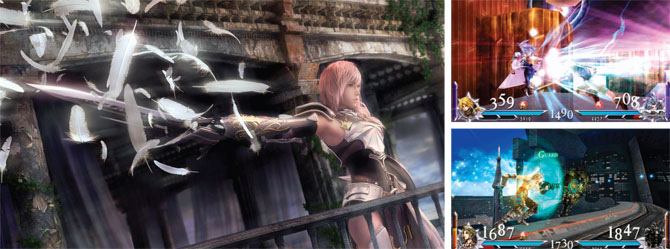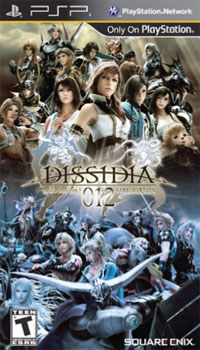

Platform: PlayStation Portable
Publisher: Square Enix Dissidia 012[duodecim] Final Fantasy (yeah, that’s the actual title) is the prequel and follow-up to 2009’s Dissidia Final Fantasy, a 3-D fighting game that featured characters from each installment of Square Enix’s long-running Final Fantasy JRPGs. Duodecim is more of the same, and it’s great. Nine new characters have been added to the Dissidia roster, bringing the total up to 31 (15 of whom you have to unlock)—most notably Lightning, the protagonist of Final Fantasy XIII, and Tifa, the busty supporting female character from the most famous and popular game in the franchise, Final Fantasy VII. This somewhat rectifies the gender imbalance of Dissidia (which featured only three female characters, one of whom was a genderless god of destruction who merely took female human form), but it’s still a giant sausagefest. Dissidia’s story was ludicrous and asinine; Duodecim’s story is ludicrous but well presented. The goddess of harmony and the god of discord are in the midst of war, and they’ve called up champions from a bunch of different worlds to join their ranks. The champions are trapped in an endless cycle of pointless violence and getting angry because of it; they begin to realize that it does them no good and they want it to end. The premise has little relevance to the lives of real humans, but at least the dialogue is good this time around. Dissidia’s storyline unlocks as a playable extra on completion of Duodecim, which would be neat if the old material were anywhere near as strong as the new. What I really want to talk about, though, are the game mechanics. Duodecim is a one- or two-player fighting game that’s unlike anything in the genre. Characters are customizable—each has a unique set of combat moves, about half of which can be equipped at any given time. It makes for a lot of variety when applied across 31 characters. Combat relies on managing “Bravery” and “Health” stats that initiate two different sets of attacks. Bravery attacks are easy to land and drain your opponents’ Bravery while increasing your own. Health attacks are hard to land but damage your opponents’ Health equal to your current level of Bravery while reducing your Bravery to zero. The game is a stat-based tug-of-war between two combatants until one’s Bravery score is high enough for a Health attack to significantly damage his or her opponent. It sounds simple, but the game includes swordsmen, mages, gunners, and one character who fights with tentacles and laser beams. All of them are completely unique in terms of gameplay. Unlike conventional side-scrolling fighting games, the camera is set up like a third-person action game. Combat arenas are huge, asymmetrical, and destructible, which allows characters to be thrown through walls. The game’s two-button controls and the way Bravery paces matches makes for viscerally satisfying, button-mashing fun. Aside from the fighting, there’s a whole bevy of ancillary systems to explore. Characters gain experience by leveling up and learning new abilities, and you can buy them new equipment and costumes. The story mode is stretched over several distinct episodes, each spotlighting a different character. Dangerous areas are navigated through a sort of chessboard interface in which you position your character to enter chains of multiple fights to earn the most currency for purchasing weapons and equipment. New to Duodecim (aside from the nine new characters) are the world map, which is barely worth mentioning, and the assist feature, which allows you to call in backup to help during fights by expending “Assist Bar” points. The ability to select any character as a partner significantly increases customization, although, to be honest, most assisting characters play about the same. Besides a few shortcomings, it’s the best game I’ve played for the PSP and the only one I currently play on the console. If you’re interested in an action game that looks, sounds, and plays terrifically, it’s perfect, even if you don’t care about Final Fantasy. A new law requires us to state that this review was based on a retail copy of Dissidia 012[duodecim] Final Fantasy provided by Square Enix, so get used to seeing this little disclaimer here.